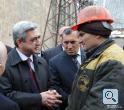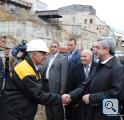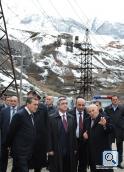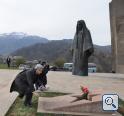Updates
Press releases
31
03, 2009
President Serzh Sargsyan conducted a working visit to Syunik marz
On March 31, President Serzh Sargsyan conducted a working visit to Syunik marz.
First, President of Armenia visited the copper and molybdenum producing factory in Kajaran. Serzh Sargsyan familiarized with the work of the factory and had a brief meeting with the workers in the production units.
At the Erablur pantheon in Kapan, the President of Armenia laid wreaths at the Memorial for those who perished in World War II and at the cross stone in the memory of those missing in action since the Artshakh war.
Afterwards, President Sargsyan conducted a working meeting at the administrative center of the marz. At the meeting discussed were issues related to the activities of the mining industry in the region under the ongoing economic and financial crisis, future actions to be taken in that area, the current social and economic situation in Syunik, and some related priority issues.
In his opening remarks the President of Armenia said, ”I started my visit from the Kajaran copper and molybdenum producing factory and we saw first hand that the factory is not only fully operational but is also implementing the development projects. I am well familiar with the situation at the Agarak and Kapan factories. My assessment is clear-cut: the current state of the Agarak and Kapan factories results from tenacious and efficient work of their owners and the management of the factories. I have no doubt that some tough decisions have been made.
My conclusion is also clear-cut: these three major enterprises can and must operate. They must operate even if the profit approaches zero, with the understanding that they are not only solving important social problem but are working toward the future returns. I am confident that had the Kajaran factory not functioned in difficult conditions in late 1990s – early 2000s, it would not have been profitable in the last five or six years.
Enterprises should work, and with this regard if the Government of Armenia is expected to do more we are ready to discuss these issues. About the crisis in general: in recent months we have been able to solve a number of problems and from now on we will not stumble over any difficulty.
The global crisis dramatically reduced the prices of copper and molybdenum: in just a couple of months they fell 3-3.5 times. Not only these enterprises have found themselves in a difficult situation, since everybody knows that a big chunk of our exports is directly related to the work of these factories, but also problems have arisen in the areas of revenues and tax collection. The Government has been working constantly with the leading enterprises of the industry to create opportunities to overcome the difficulties and in some cases it is implementing the assistance programs with diversified approaches to the issue. We are confident that the Government’s assistance, comebacks which are in the area of the Government’s competence, must be swift. In private sector-government cooperation we must be able to solve state as well as regional problems.
Obviously, it was not possible to provide every regional or state enterprise with similar solutions which would allow to work with no interruptions in these extremely unfavorable conditions. However, I believe that we have reached a stage when we should think about the functioning of not only these three particular factories but about the continuous functioning of many of our enterprises.
Besides, the recent depreciation of the national currency and positive tendencies with regard to the international prices for metals create somewhat favorable conditions. We should take advantage of these cooperatively good and somewhat favorable conditions.”
The President of Armenia tasked the relevant regional structures with one precise assignment and noted “there will no reductions in wages, pensions, or social benefits, and there will be no problems with delivering them to the people on time. No matter what, the wages of the teachers, policemen, and workers must be paid in time, and any delay will be considered by us as bad work. The state budget allocates the money and it must be delivered in time. Currently it is the most important task.”
At the meeting the Vice Prime Minister, Minister for Territorial Administration Armen Gevorkian and the Head of Syunik regional administration Surik Khatchatian presented the social and economic situation in the region and the most inclusive issues.
First, President of Armenia visited the copper and molybdenum producing factory in Kajaran. Serzh Sargsyan familiarized with the work of the factory and had a brief meeting with the workers in the production units.
At the Erablur pantheon in Kapan, the President of Armenia laid wreaths at the Memorial for those who perished in World War II and at the cross stone in the memory of those missing in action since the Artshakh war.
Afterwards, President Sargsyan conducted a working meeting at the administrative center of the marz. At the meeting discussed were issues related to the activities of the mining industry in the region under the ongoing economic and financial crisis, future actions to be taken in that area, the current social and economic situation in Syunik, and some related priority issues.
In his opening remarks the President of Armenia said, ”I started my visit from the Kajaran copper and molybdenum producing factory and we saw first hand that the factory is not only fully operational but is also implementing the development projects. I am well familiar with the situation at the Agarak and Kapan factories. My assessment is clear-cut: the current state of the Agarak and Kapan factories results from tenacious and efficient work of their owners and the management of the factories. I have no doubt that some tough decisions have been made.
My conclusion is also clear-cut: these three major enterprises can and must operate. They must operate even if the profit approaches zero, with the understanding that they are not only solving important social problem but are working toward the future returns. I am confident that had the Kajaran factory not functioned in difficult conditions in late 1990s – early 2000s, it would not have been profitable in the last five or six years.
Enterprises should work, and with this regard if the Government of Armenia is expected to do more we are ready to discuss these issues. About the crisis in general: in recent months we have been able to solve a number of problems and from now on we will not stumble over any difficulty.
The global crisis dramatically reduced the prices of copper and molybdenum: in just a couple of months they fell 3-3.5 times. Not only these enterprises have found themselves in a difficult situation, since everybody knows that a big chunk of our exports is directly related to the work of these factories, but also problems have arisen in the areas of revenues and tax collection. The Government has been working constantly with the leading enterprises of the industry to create opportunities to overcome the difficulties and in some cases it is implementing the assistance programs with diversified approaches to the issue. We are confident that the Government’s assistance, comebacks which are in the area of the Government’s competence, must be swift. In private sector-government cooperation we must be able to solve state as well as regional problems.
Obviously, it was not possible to provide every regional or state enterprise with similar solutions which would allow to work with no interruptions in these extremely unfavorable conditions. However, I believe that we have reached a stage when we should think about the functioning of not only these three particular factories but about the continuous functioning of many of our enterprises.
Besides, the recent depreciation of the national currency and positive tendencies with regard to the international prices for metals create somewhat favorable conditions. We should take advantage of these cooperatively good and somewhat favorable conditions.”
The President of Armenia tasked the relevant regional structures with one precise assignment and noted “there will no reductions in wages, pensions, or social benefits, and there will be no problems with delivering them to the people on time. No matter what, the wages of the teachers, policemen, and workers must be paid in time, and any delay will be considered by us as bad work. The state budget allocates the money and it must be delivered in time. Currently it is the most important task.”
At the meeting the Vice Prime Minister, Minister for Territorial Administration Armen Gevorkian and the Head of Syunik regional administration Surik Khatchatian presented the social and economic situation in the region and the most inclusive issues.








